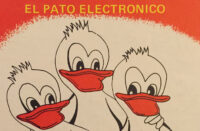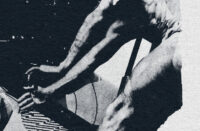Revisiting the idiosyncratic cycling sound eddies and steadfastly original catalog of soundsculpturist Philip Jeck, who passed into the space-time continuum’s Möbius strip on March 25, one is struck by his ability to regularly conjure a sense of tangible nonplace.

Onward to the next cycle, Mr. Jeck
Revisiting the idiosyncratic cycling sound eddies and steadfastly original catalog of soundsculpturist Philip Jeck, who passed into the space-time continuum’s Möbius strip on March 25, one is struck by his ability to regularly conjure a sense of tangible nonplace. Such abilities were further magnified in their audacity by Jeck’s tools of choice: Bush, Phillips, Dansette, and Linn turntables, old, beat-up LPs, a motley collection of sound modules, the odd Casio and/or audio processor. Something old, something new, many things borrowed, nothing simply blue…
Using record players and records themselves as sound generators had long been the purview of the hip-hop world, and though samplers were already cheap and affordable in the 90s, Jeck was attracted to the tactile possibilities inherent in physical media. Perhaps it was the malleability and unpredictability such means offered; there was a contradictory sense of both the obvious and the alien in using pre-existing sounds to birth new ones, a hubris about it all, but Jeck never fell back on anything remotely obvious, hackneyed, or clichéd. The soundscapes, landscapes, and, again, the familiar/unfamiliar concept of ‘nonplace’ figured prominently in his work; territories sometimes foreboding, glimpsed through partially closed eyelids, distorted, awry, and ever so fascinating.
The complexity of what Jeck accomplished over the years, mostly solo but also in the company of like-minded colleagues such as Janek Schaffer and Jacob Kirkegaard, revealed a boundary-less imaginative vista in lockstep with a compositional mien of unerringly sharp detail. Jeck’s long-standing relationship with the equally forthright Touch label allowed us as listeners to experience his art unfold and take vivid shape in real time, album by album, and marvel at how each recording managed to differentiate itself from the previous. On Loopholes, his Touch debut, the tumbling marimbas decorating “Casio” appear at odds with the chugging noise-scree of “PS One”, but it’s all of a piece, Jeck situating us in worlds of fourth, fifth, and myriad denatured provinces. There’s no categorical signposts to latch onto, no easy entreé; you simply engage and let the sounds run rampant.
Jeck’s way with turntable and tone-arm never degenerated ::
As Jeck’s catalog grew, he found a number of simpatico voices that mirrored his multivalent approaches. Collaborating with the likes of Janek Schaefer on the pair’s 2004 release Songs for Europe revealed an existential travel guide of cinematic broadband, where a veritable whirlwind of moods are conjured by low-key oscillations, acoustic instrumentation reconfigured as foleys that strafe the soundstage, sinkholes of dialog snatched from street corners and crowded marketplaces, mini-movies unspooling for the mind’s eye. Jeck’s 2003 release with Kirkegaard, the enigmatic Soaked, weaved its delicate spell across seven chapters of stunning microscopic detail, the duo in sync like two chemists unlocking new sonic formulae, crisp vinyl detritus crackling with febrile life, sprouting amidst shimmering, biotoxic atmospheres.
Remarkably, Jeck’s way with turntable and tone-arm never degenerated into anything approaching gimmick, pastiche, or incoherence. Longform works such as Vinyl Coda I-III (Intermedium) or Host (Sub Rosa) are presented with an obvious felicity to their creation, auguring dense soundworlds that require a lifetime to explore. Jeck’s live sound installations were no less audacious: as cited on his Discogs bio, his presentation “Vinyl Requiem”, a performance using no less than 180 ’50s/’60s record players, won the Time Out Performance Award in 1993. His most recent work, 2017’s Iklectik, uncannily sounds like a personal requiem itself, its solemn frequencies and glacial tonalities presaging the long twilight to a brilliant career seemingly left unfinished, and now, looped to infinity.
Onward to the next cycle, Mr. Jeck.
(Photo: courtesy Touch Music / https://touch33.net)
Iklectik and Stardust (by Faith Coloccia & Philip Jeck) are available on Touch. [Bandcamp]


















![Hasbeen :: Bunker Symphonies II (Clean Error) — [concise]](https://igloomag.com/wp/wp-content/uploads/2025/04/hasbeen-bunker-symphonies-ii_feat-75x75.jpg)
![Extrawelt :: AE-13 (Adepta Editions) — [concise]](https://igloomag.com/wp/wp-content/uploads/2025/04/extrawelt-ae-13_v_feat-75x75.jpg)
![Beyond the Black Hole :: Protonic Flux EP (Nebleena) — [concise]](https://igloomag.com/wp/wp-content/uploads/2025/04/beyond-the-black-hole-protonic-flux_feat-75x75.jpg)
![H. Ruine, Mikhail Kireev :: Imagined / Awakenings (Mestnost) — [concise]](https://igloomag.com/wp/wp-content/uploads/2025/04/h-ruine-mikhail-kireev-imagined-awakenings_feat2-75x75.jpg)


![Squaric :: 808 [Remixes] (Diffuse Reality) — [concise]](https://igloomag.com/wp/wp-content/uploads/2025/04/squaric-808-remixes_feat-75x75.jpg)

